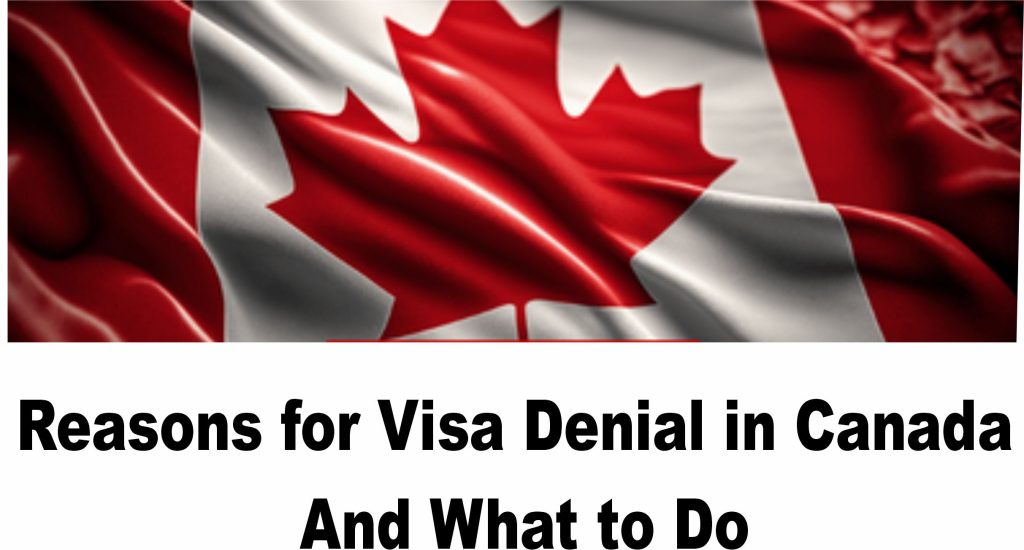Reasons for Visa Denial in Canada and See What to Do
Have you being applying for Canada visa whether for study,work or permanent residence and your visa application denial. Then welcome to this page, We will give you possible reasons why your Visa was not approved and provide you solutions on what to do. Understanding the common reasons for visa denial in Canada and knowing how to avoid these mistakes can improve your chances of success.
Reasons Why Canadian Visas Get Denied
Each year, thousands of visa applications are submitted to Canadian immigration authorities, but not all are successful.
Knowing the specific factors that often lead to visa denials can help applicants avoid making the same mistakes.
Let us show you some reasons for visa denial in Canada and how to mitigate and avoid it:
1. Improper Documentation
One of the most common reasons for visa denial is submitting incomplete or inaccurate documentation.
The Canadian immigration process requires a variety of documents to verify your identity, financial status, purpose of visit, and more.
READ: FIRS Recruitment 2024/2025- Application Link and How to Apply
- What to do: Carefully review the list of required documents for your specific visa category, whether it’s a study permit, work permit, or visitor visa. Double-check all your paperwork to ensure it’s complete and that details like names, dates, and addresses are accurate. It’s also a good idea to have a trusted advisor or immigration consultant review your application.
2. Insufficient Proof of Financial Means
Canada requires visa applicants to prove they can support themselves (and any dependents) while in the country.
This applies to all visa types, from student permits to work visas.
Applicants must demonstrate sufficient funds to cover tuition, living expenses, and return travel.
- What to do: Ensure you have proof of adequate funds in your bank account and provide statements showing a consistent balance over several months. Avoid large, unexplained deposits, as this may raise questions about the source of funds. If you’re using a sponsor, provide proof of their financial stability and a letter confirming their support.
3. Lack of Ties to Home Country
When applying for a temporary visa, such as a visitor or student visa, Canadian immigration officials want to see evidence that applicants intend to return to their home country once their visa expires.
A perceived lack of ties to the home country is a frequent reason for denial.
- What to do: Show proof of significant ties to your home country, such as property ownership, employment, family relationships, or other obligations. Including a letter that outlines your reasons for returning, such as a job offer or family commitments, can help strengthen your application.
4. Purpose of Visit Not Clear or Inconsistent
If the purpose of your visit to Canada isn’t clear, immigration officials may question the legitimacy of your application.
This can happen when applicants provide conflicting or vague information regarding their travel intentions.
- What to do: Clearly state your reason for visiting Canada and ensure that all parts of your application align with this purpose. For example, if you’re applying for a study permit, provide details of your educational program, acceptance letter, and long-term academic goals. Avoid any inconsistencies, as these can be grounds for suspicion.
5. Previous Visa Denials or Immigration Violations
Having a history of visa denials or previous immigration violations can impact your current application.
Canada is cautious when it comes to applicants who have been denied visas in the past, especially if the reasons involved fraud or misrepresentation.
- What to do: Be honest about past denials in your application, and don’t try to conceal prior immigration issues. If applicable, address the reasons for previous denials and explain any corrective actions taken. Working with an immigration consultant to resolve these issues can improve your chances.
6. Failure to Meet Health or Security Requirements
Canada prioritizes the health and safety of its citizens and requires all applicants to meet specific medical and security standards.
Certain medical conditions or criminal records can be grounds for visa denial.
- What to do: If a medical exam is required, follow through with all necessary tests and procedures. Disclose any medical conditions honestly and provide documentation showing that your condition is under control, if applicable. For security requirements, ensure that your police clearance certificate is recent and accurate. If you have a criminal record, consider consulting a lawyer about the possibility of rehabilitation before applying.
7. Lack of English or French Language Proficiency
Certain Canadian visa programs, particularly work and study permits, require proof of language proficiency in English or French.
If you fail to meet these language standards, your application may be denied.
- What to do: Take an approved language test, such as IELTS or CELPIP for English, or TEF for French, and ensure your score meets the requirements for your visa type. Submit your results with your application, and if you’re close to the threshold, consider retaking the test to improve your chances.
8. Incorrect Visa Category
Applying for the wrong type of visa is a common mistake, especially if applicants are unsure about the nuances of Canadian immigration programs.
Selecting the wrong visa category can result in immediate denial.
- What to do: Carefully research visa types and choose the one that aligns with your purpose. If you’re unsure, consult an immigration advisor or visit the official Government of Canada website to ensure you’re applying for the correct category.
9. Inadequate Travel History
For certain visa types, a lack of travel history can be seen as a red flag, as immigration authorities may question an applicant’s travel intentions or history of adherence to visa conditions.
- What to do: If possible, build up a record of travel to other countries with successful returns. If you don’t have much travel history, include strong proof of ties to your home country and a clear statement about your purpose for visiting Canada.

